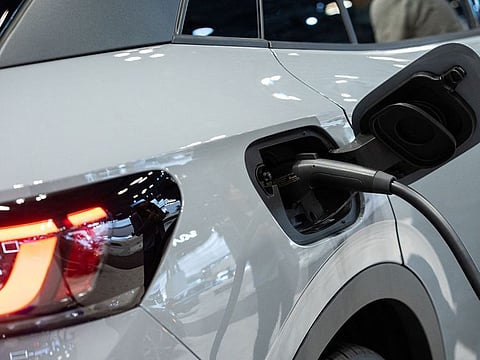UAE car buyers choosing imported EVs from the 'grey market' are in for a shock
EVs brought into UAE via unofficial channels will have range issues and more

Dubai: Anyone thinking of importing their choice of an EV (electric vehicle) for use in the UAE need to have a serious re-think, warn auto manufacturers and dealerships. While Tesla has been the brand most favoured when it comes to such imports, other manufacturers too are starting to see their EV models make it to the roads here – and without the owners sufficiently aware of the risks.
Victor Dalmau, Managing Director of Volkswagen Middle East, is particularly vocal about what these car owners could be in for. “The Volkswagen all-electric products (ID.3, ID.4, ID.5, ID.6) sold by unofficial importers in the UAE are the Chinese variants of these,” said the German maker’s top regional official. “They have been designed and built for the Chinese market and not for the UAE market. This has three consequences for customers buying these vehicles from those traders:
• These vehicles do not meet all the legal requirements set by the UAE authorities.
• These vehicles have not been tested, nor authorized, by Volkswagen to be used in the UAE. Therefore, the brand cannot guarantee their full proper functionality.
• As a consequence, these products have no warranty from the manufacturer nor can be serviced by our official Volkswagen dealerships.”
A sudden rush in demand
It’s in the last six months that the imported EVs are starting to be more visible, with owners seeing the switch from fuel to battery as a lifestyle statement. (It could also be that many of them retain both driving options.) The initial rush was for Tesla’s super-premium models, but has now filtered down to the Model 3 too. As for legacy auto brands, almost all have some EV models in their range and getting buyers interested.
This is also where the problem starts. “There is a three- to six-month lag on the delivery side for most of the in-demand EV models, and some buyers are not willing to wait,” said a top official with a dealership. “That’s when the imports happen – and all these buyers seem to think fixing an imported EV through some local garage is easy. That’s where the problem starts.”
It’s all in the software
Now, any carmaker will tell you, fixing an EV is more about the software than cleaning up the hardware nitty-gritty. “The Volkswagen EVs are run by a software that manages all functionalities of the car, from the infotainment to the power management of the batteries,” said Dalmau.
“Similar to our phones, Volkswagen constantly updates the cars via internet. Since these cars have the software designed for the Chinese market, Volkswagen would not be in a position to keep them updated in the UAE.
“Imagine you buy a phone and the manufacturer cannot update it: soon it will have limitations in its capabilities (or even malfunctions).”
You definitely don’t want that happening when driving on the highway.
Range guarantees
EVs that guarantee a certain range are done when built with specific markets in mind. Those same vehicles when brought to a new market need not deliver to the same expectations, more so when accounting for the climate in the UAE/Gulf.
In addition, according to the VW official, “The UAE law requires, among many other things, all new models to have a safety feature called e-Call, which enables the car to automatically notify the police and emergency services should you be in an accident and unable to so yourself. An unofficially imported car cannot perform this as the e-Call is not designed for the UAE network.
“Since our official dealers will not be able to service these cars, we cannot guarantee to our customers that these cars will be serviced by technicians that are properly trained by Volkswagen, using genuine parts and repair tools that ensure the quality in repair the brand is committed to.”
These warning are being repeated by other makers and dealers. Are owners listening?
Question of price
A good number of EV imports are bought because the owners believe they are paying less than what they would have to an official dealer. Also, if a third-party importer or seller is involved, they would guarantee that all maintenance and repair work would be carried out. In reality, is that the case?
According to Dalmau, “We can’t compare prices, since there is no price decided for official imports, given that the car is not officially launched yet in the UAE. The traders selling these cars are trying to give their customers as much peace of mind as they can, offering local warranty, etc.
“The fact is that these cars are not developed nor authorized by Volkswagen for the UAE. If any issues arise, the customer won’t be able to count on Volkswagen’s support. I don’t think customers buying these vehicles fully realize the risks involved, especially as these vehicles have completely new technology and the software requirements of constant updates.”
Sign up for the Daily Briefing
Get the latest news and updates straight to your inbox



